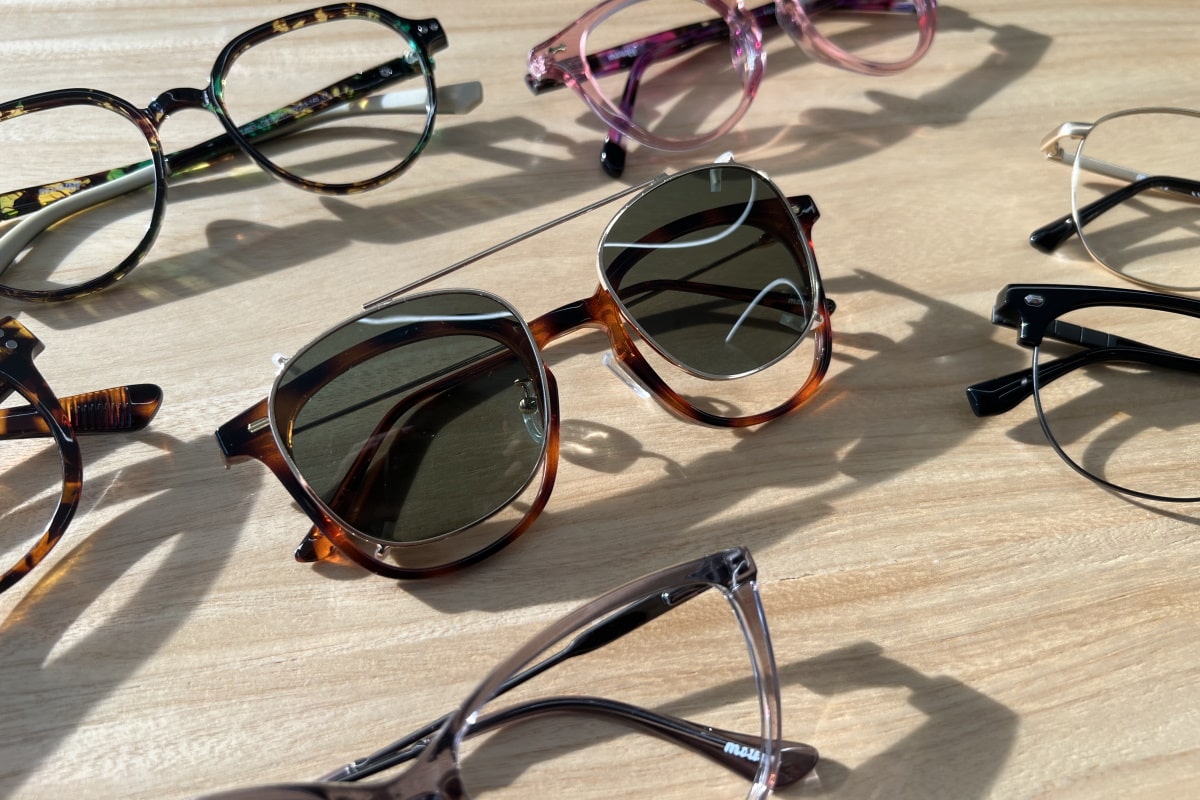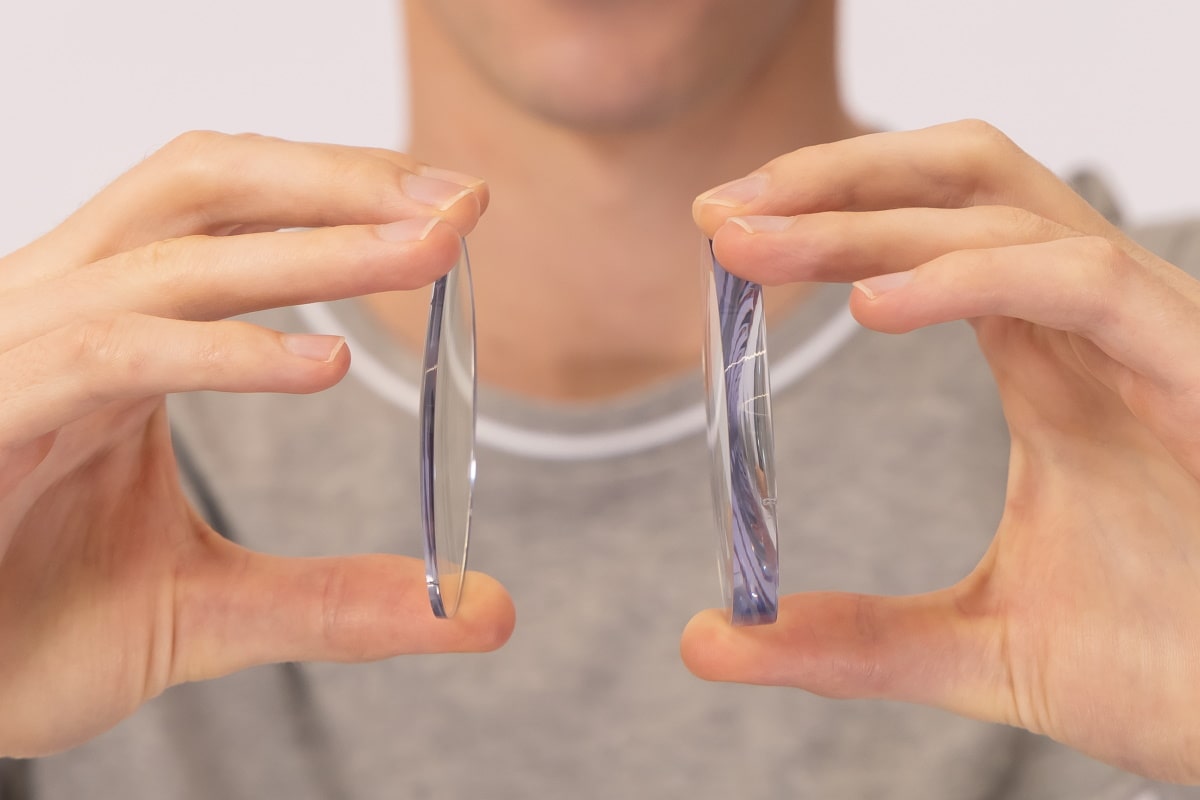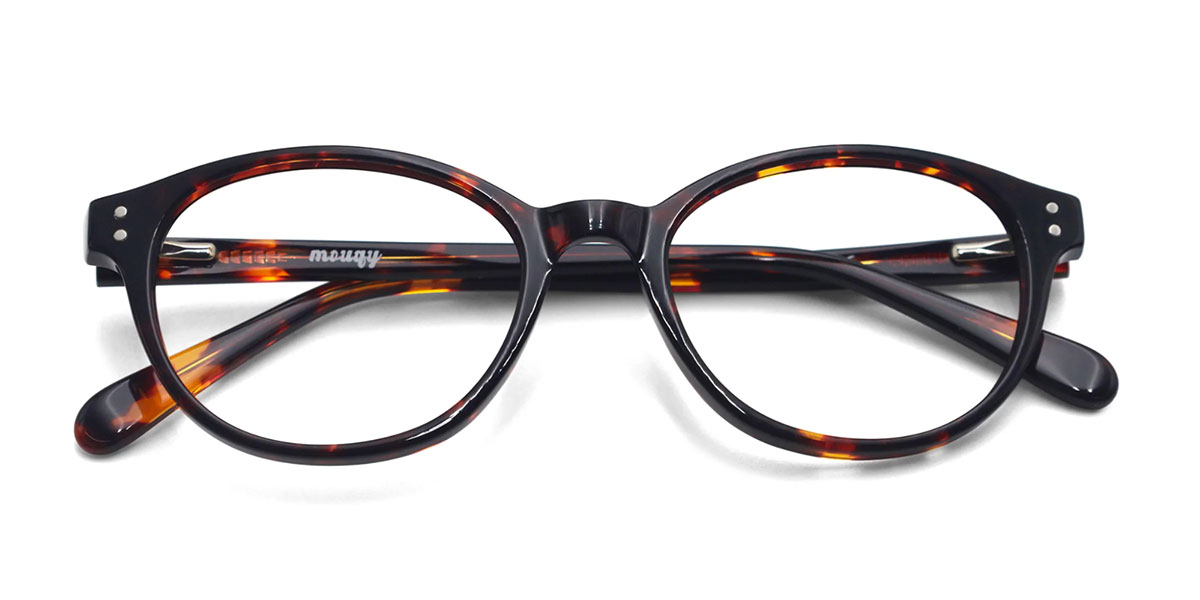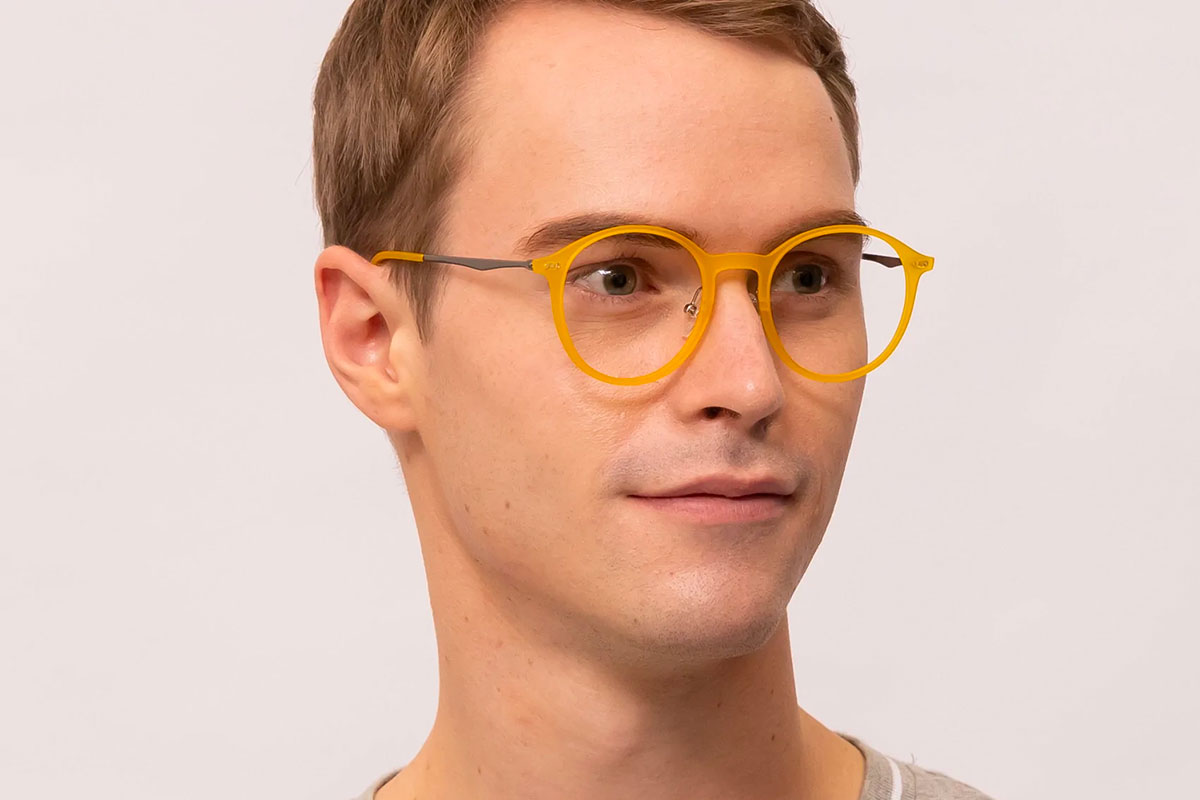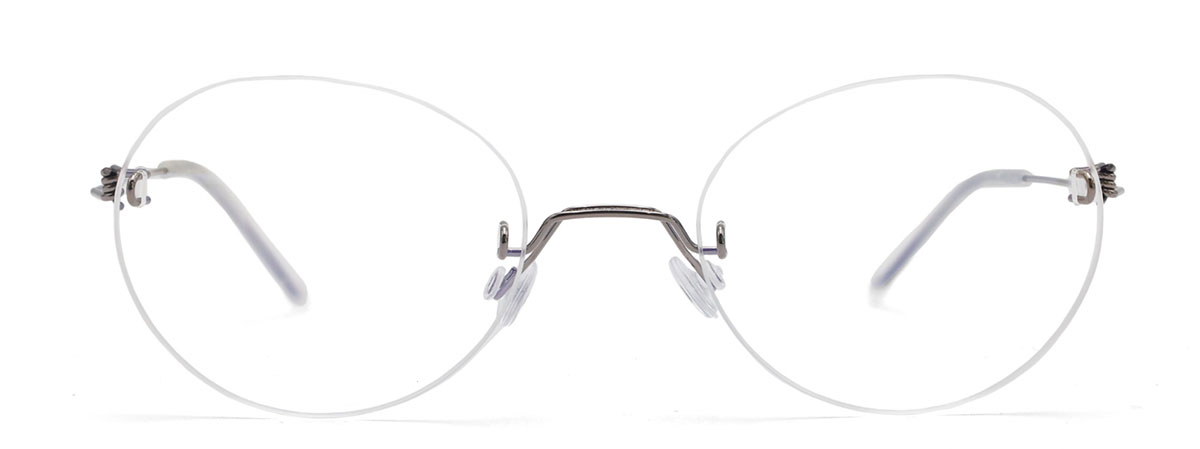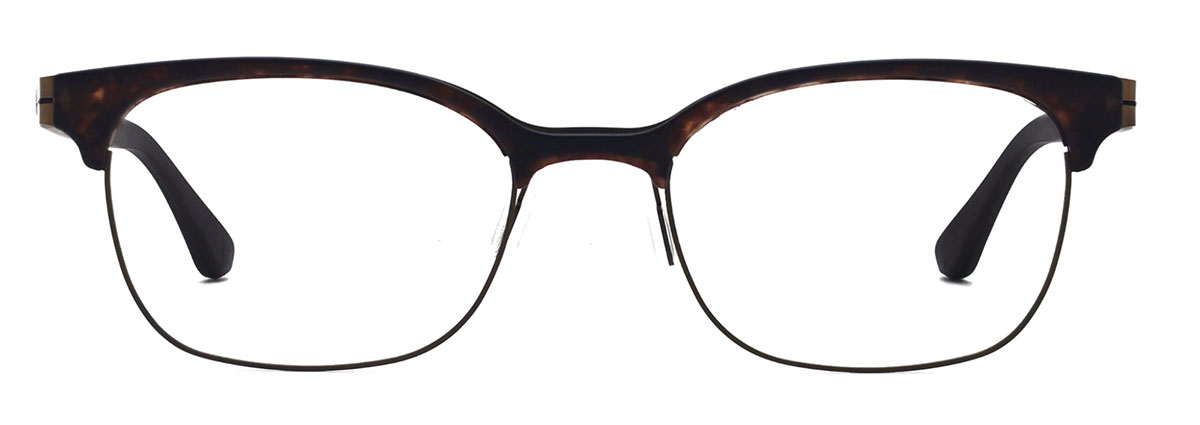Plastic vs. Polycarbonate Lenses: Which Should You Use for Glasses?
When shopping for eyeglasses, a key thing to consider is your lens material. To start with – should you get plastic or polycarbonate lenses? Many people get confused about the differences.
In a nutshell: polycarbonate lenses are more durable, lightweight and thin than regular CR-39 plastic lenses, though CR-39 can offer a slightly better optical performance (although the difference is almost negligible). Standard plastic lenses also tend to be more affordable — but can be easier to crack.
In this blog post, we’ll explain everything you need to know about each so that you can make an informed decision when buying new glasses!
An overview of plastic lenses
What are plastic lenses?
Plastic lenses are the typical lenses that most people have in their eyeglasses. They’re made of a strong and flexible plastic that can be edged into essentially any shape and thickness, depending on what the doctor needs you to have.
Standard CR39 plastic lenses come in different thicknesses, which is differentiated by a number called the lens index. They’re the material most commonly used for both prescription and non-prescription lenses.
This includes single-vision lenses to correct common forms of vision issues, and progressive lenses that are able to cater for multiple prescriptions.
A quick history of plastic lenses
An optical plastic lens was invented in the early 20th Century, though these had low light transmission rates and refraction indices. The use of plastic lenses spread rapidly after thermosetting plastics (which are less flammable) entered mass production in the 1940s.
One such type of lens was made from CR39 plastic, which is still widely used today. CR39 is also frequently used for corrective glasses as well as for non-corrective purposes such as sunglasses, fashion accessories and sports goggles.
Pros of plastic lenses
- LightweightPlastic lenses are very lightweight and, therefore, comfortable to wear since your frames won’t rub so heavily on the nose.
- AffordablePlastic lenses are very easy to manufacture and don’t come with a high price tag. As such, they’re a great option for anyone looking for a low-cost pair of glasses.
Cons of plastic lenses
- They can get scratched easilyPlastic lenses can be prone to scratches and scuffs, which means they need to be replaced if they aren’t equipped with a scratch-resistant coating.
- They bend and break more easilyPlastic lenses are also much more prone to bending and breaking than polycarbonate lenses, which means they can become unusable if dropped or placed in hot conditions.
An overview of polycarbonate lenses
What are polycarbonate lenses?
Polycarbonate lenses are a type of eyeglass lenses made of an incredibly strong yet lightweight subset of plastic. They’re designed to withstand impact, correct vision issues and support more active lifestyles.
Polycarbonate lenses are usually thinner and lighter than other types of lenses, which makes them ideal for people who want to wear glasses but don’t want to sacrifice style for durability.
Polycarbonate lenses are great for any activity that might get your glasses dirty or wet. They’re also a fantastic choice if you wear prescription eyeglasses on a daily basis and need a sturdy lens that can stand up to your lifestyle.
Because of their durable material, they’re prone to scratching or breaking and ideal for sporty activities like running or cycling, as well as outdoor activities like hiking or camping.
A brief history of polycarbonate lenses
Polycarbonate lenses are a relatively new lens technology. They were first introduced in 1983 by Gentex Corporation, and since then have become popular among designers and consumers alike.
They offer a higher refractive index and are incredibly strong and durable, which makes them ideal for use in products such as glasses that need to be thin enough to fit comfortably on someone’s face but also need to be able to withstand regular wear and tear.
Pros of polycarbonate lenses
- Impact resistantPolycarbonate lenses are some of the most impact resistant lenses on the market, which makes them ideal for use in sunglasses and other products that will be worn by people who do a lot of active activity.
- Lightweight and comfortablePolycarbonate lenses have a high refractive index, which means they can be a thinner and more lightweight solution for your prescription, when compared to plastic lenses of the same power. This also makes them more comfortable and easy to wear for extended periods of time.
- UV protectionPolycarbonate lenses provide excellent UV protection, which makes them ideal for use in glasses and other products that need to protect the eyes from the sun’s harmful rays. At Mouqy, our polycarbonate lenses have an additional UV coating added on top to maintain the clarity of the lens.
- VersatilityPolycarbonate lenses can be used in a wide range of products, including sunglasses and safety glasses. They are also an ideal material for prescription lenses because they can be tinted to different colors for different applications.
Cons of polycarbonate lenses
- CostPolycarbonate lenses are more expensive than other types of plastic, and so, polycarbonate lenses tend to require a larger budget. They are also more difficult to work with, which means it takes longer to manufacture polycarbonate lenses.
Plastic vs. polycarbonate: at a glance
Here’s a quick overview of the differences.
| Features | Polycarbonate lenses | Plastic lenses |
| Thickness | 30% thinner than plastic | Thicker |
| Weight | Even lighter than plastic | Lightweight |
| Optical clarity (Abbe value) | 30 | 58 |
| Impact resistance | 10x sturdier than plastic | More impact-resistant than glass but less than polycarbonate |
| Tensile strength | 44.9kgf | 6kgf |
| UV protection | 100% (however, they still require an additional UV coating to prevent them yellowing) | Needs UV coating |
| Cost | $160 on average | $75 on average |
Frames recommended for polycarbonate lenses
Here at Mouqy, we specialize in making affordable and stylish glasses for all sorts of needs, from fashion to sports to outdoor activities.
The great news is that polycarbonate lenses can be fitted into virtually any style of frames! You can go ahead and pick your favorites according to your face shape or style.
Our favorite full-rim picks for polycarbonate lenses
You can wear polycarbonate lenses with virtually any full-rim style.
Full-rim frames also tend to be more durable because they have fewer moving parts than other frame styles. This can make them a little more suitable for sports and other outdoor activities, for those times you don’t want to wear contact lenses.
Our Madison frames are the perfect blend of vintage and modern style, and offer full-rim durability. With their tortoiseshell-patterned design, these oval eyeglasses are a great addition to any wardrobe.
Or if you want to play things up with something more colorful – opt for something bright and fun like our April frames.
Our favorite rimless and semi rimless picks
Polycarbonate lenses work especially well on rimless and semi-rimless styles.
Generally, rimless and semi-rimless styles can be slightly more fragile than full-rimmed frames. However, the added durability of the polycarbonate material means that these glasses should hold up much better for everyday use than your average plastic lenses.
Here are some of our favourites!
Dapper is a sleek, modern take on rimless glasses. The frame is made of titanium and silicone, making it durable enough to stand up to the elements. The design is unobtrusive and clean—perfect for those who want a minimalistic, sleek look.
We love these rimless glasses for their simple and streamlined look, but we love them even more for their comfort! The thin metal temples and silicon tips at the end of each arm provide stability, while remaining lightweight enough to be worn all day long—without overwhelming your face.
Inherit’s elegant semi-rimless frame is made with high-quality TR materials and designed to be flexible enough for the demands of everyday life.
Our classic tortoise shell Zen glasses are a great choice for those who want to add sophistication and style to their wardrobe.
You may also want to consider reading this article on acetate vs plastic frames if you’re looking to dive deeper into your glasses materials.
Polycarbonate lenses vs plastic: which is the winner?
And that’s it! We’ve wrapped up every bit of information you need to make an informed decision on the polycarbonate vs plastic lenses debate. Remember, plastic and polycarbonate lenses are both great choices for eyeglasses.
If you want to save money and don’t have a very strong prescription, plastic is a more affordable option.
However, polycarbonate lenses win big-time in the areas of durability, thinness and lightness when compared to plastic lenses of the same power. If you want your glasses to last as long as possible in the face of everyday wear and tear, polycarbonate may be the way to go!

Written by:
Shu Kie

